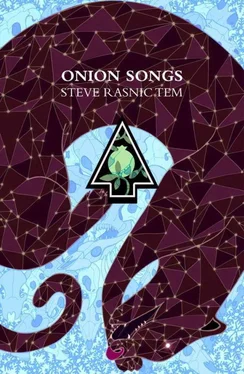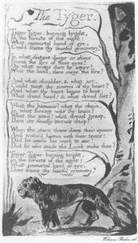Some day, she would. She would travel as far as her heart’s desire.
Boyo strolled up beside her, resplendent in his gendarme’s uniform. “ Et tu , Senorita?”
“No, Boyo. That’s Latin and Spanish.”
“But isn’t Latin, Spanish?”
“Sort of. Are you here to protect me, Gendarme?”
“ Wie bitte?”
“Never mind, you’re speaking German again. Können Sie mir helfen?”
“ Was möchten Sie?”
“Could you tell me why you hate us?”
“But you’re British. We only hate the British when they act like Americans.”
“And how do the Americans act?”
“Why, they act like they’re the Dad.”
“But I’m not the Dad. We all can’t be the Dad.”
The creek had risen out of the grass and was flowing toward the ocean now. Big Sis filled her teapot with its clear, liquid gold. Suddenly her tiara fell forward and somersaulted into the fast-moving water. She started crying—now she could never be a princess.
By the time Big Sis and Boyo returned to the house it was nearing nightfall, and Big Sis was afraid of another night alone in the dark. She knew she would have her family around her, but she also knew that once she closed her eyes she would be alone in the dark again.
She was surprised and delighted that the Dad and the Mom had built a great bonfire out in the front of the house. Gal Pal was strumming her guitar, singing sad Spanish songs of death and unrequited love. “ De la sierra morena .”
The family sat around and toasted marshmallows. They watched as something bright shot across the sky. The Mom said, “You know, it might just be a meteor. A shooting star.”
The Dad said, “No, it was just a plane from some airport nearby.”
Boyo said, “Isn’t it great that all the peoples of the world share the same sky?”
The Dad said, “No, that isn’t exactly true.”
Gal Pal, who had offered nothing to this gathering but song, asked the Dad, “Why do you like spoiling things all the time?”
The Dad replied, “Well, we all die alone, even those of us in families.”
A dark child wandered out of the night and sat down by the fire. She wrapped her arms tightly around her knees and looked around.
The Dad said, “Careful! She’s a bomb!”
Boyo said, “She’s got a short fuse.”
Big Sis said, “Wait a minute.”
The Mom said, “Oh Jesus Christ a bomb!”
Big Sis said, “Please, wait a minute.”
The Dad said, “We gotta take care of that bomb!”
Boyo said, “Watch out!”
Gal Pal said, “Sound the alarm!”
The Dad said, “A bomb!”
Big Sis said, “Please…”
The Dad laughed and said, “Let’s all do this again next year!”
The Mom said, “Best vacation ever!”
Big Sis closed her eyes, wishing they’d never left home, and waited for the inevitable explosion.
Not for the first time he decides to go nameless. Moves to a city where they don’t know him. Tells no one of his new whereabouts. Chooses a new name using identification documents he’s paid a fortune for, then avoids using that expensive new name as much as possible.
“And your name?” they might ask at a bus stop or in the park.
“You can just call me Buddy,” he replies. Most do so without blinking an eye.
Then he spends months trying to erase both the new name and the old name from his consciousness.
The process is not particularly difficult for him. He doesn’t open his mail—drops it into the trash without a glance. He fills out only those forms he cannot avoid, looking away when he scribbles a bit of graffiti that may or may not be his signature. He answers to “Buddy,” but for him “Buddy” is no more identifying than “Hey, you.”
He deals with neither banks nor doctors. He isn’t naive enough to think that he’s achieved total anonymity—no doubt his persona has been digitized in a number of different ways. But he doesn’t think much about it. He does not avoid photographs, but always makes sure he is part of a group, which as far as he is concerned is far more anonymous than never having been photographed at all. Similarly, he rejects the life of the hermit, and wraps himself in crowds. He tries to make himself as frequently seen as lampposts and trees.
You would expect such a man to avoid diaries as if they were forbidden tomes of black lore, but he keeps his religiously, using it to report concise, non-judgmental observations, the only reporting suitable, he thinks, for an anonymous observer:
Two dogs were run over in the street today. A car avoided the first animal, then plowed into the second. At the same moment the car behind ran over the first dog. The men climbed from their cars and swore at each other. A nearby child was hysterical. No one went to the child, who cried for thirty-six minutes, fifteen seconds. Most would think such lengthy hysteria impossible, but an accurate watch cannot be denied. Eventually a female police officer came and led the child away.
The temperature was forty-five degrees at 8 a.m., climbing to seventy-six degrees at noon. At 142 Lincoln Street a dark man in a white t-shirt and green pants sat on the front step and watched the sky. At intervals varying between fifteen seconds and three minutes forty-two seconds the man wiped tears from his eyes. He said nothing when the old woman in the blue dress split her grocery bag. A can of peas rolled under a parked white Oldsmobile. She did not see it and left it behind after she’d gathered the spilled groceries. At 5 p.m. the man stood up slowly and went inside. His shoulders and knees appeared to struggle with gravity. A man in a brown suit passed him going out the door, walking very fast.
There are eight green bottles and a dead cat in the alley across the street. A man enters the alley and counts them every day. He looks at the cat and tries to determine if it has been moved. A newspaper lies beside the cat but he does not reach down and cover the cat with it. He prefers to remain nameless.
The nameless man wanders down the street with a water bottle in his hand. At every third corner he stops and takes three swallows. At some point in the past he has fainted from dehydration and is determined to avoid such incidents in the future. He continues down the street until he finds a crowd to join. For the rest of the day he moves from crowd to crowd, holding the water bottle, drinking his swallows but trying not to be too obvious about it, trying not to be seen. Both unknown and unknowable, he is a part of the grand movement of the world, he thinks, and there are others who need the moisture far more than he.
At the end of the day the man strips off his shirt and stares at himself in the mirror. He drips what’s left of the water over his head. It is a kind of baptism, he thinks, but will not pursue the idea. He imagines the remaining dust of the day dissolving from him, freeing him from this time and place.
In the morning the traffic noise begins early, at precisely 5.15 a.m. The man without a name dresses in clean gray slacks and a light blue shirt. He puts a newspaper he will not read under his arm and walks out onto the hot concrete. He strolls at a steady pace down the sidewalk with no destination in mind. The man from the day before is again sitting out on the front step crying, silently but unmistakably to those willing to notice. The man with no name walks past the crying man, pretending not to notice.
The man who will not be named slips into a mass of people on their way to work. Their movements and intentions toward movement make an intricate pattern of gravity and emotional force the nameless man has come to understand and predict. He moves with them as if within a migratory herd of long duration as they pound the pavements, casting off one member after another at bus stops and subway entrances. He is aware of the unhealing carcinoma under one dark man’s ear, a young woman’s blackened eye, the bleeding forearm of an elderly Jew where the skin has been scrubbed raw. The man without a name smells the stink of fear that leaks from pores swaddled in clothing bought with a great deal of money and very little taste. The nameless man tastes the horror in the mouths of those who cannot speak it, yet speaks none of it himself.
Читать дальше












